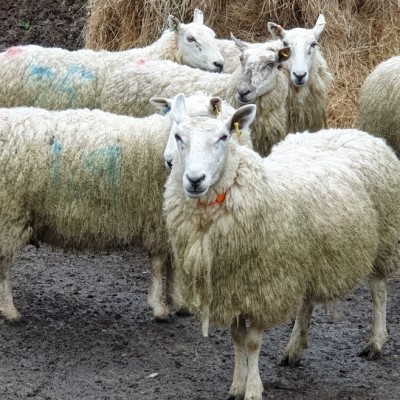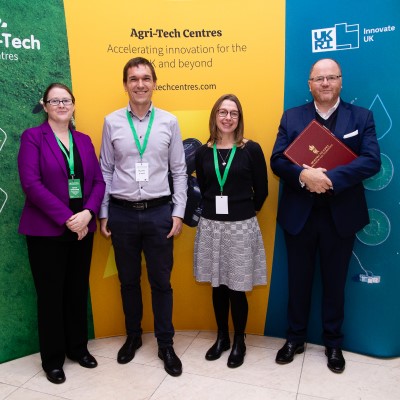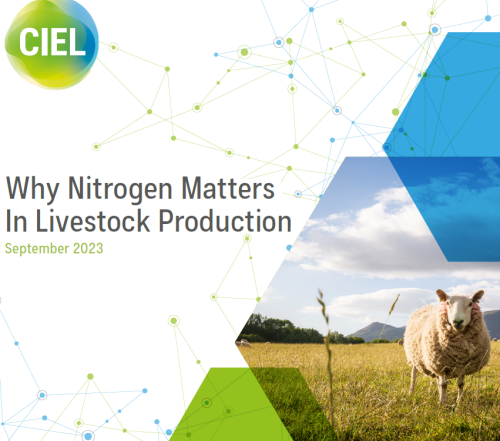CIEL | News: Tackling common livestock infection using novel technologies focus of new study
Aberystwyth University scientists are investigating new technologies, including environmental DNA analysis and the use of wearable behaviour sensors, to tackle a parasite that infects the majority of UK sheep flocks.
The liver fluke is a highly pathogenic parasite that is estimated to infect 85% of sheep flocks and 76% of dairy herds in the UK.
Infections are believed to cost the UK livestock industry up to £300 million a year due to its effect in decreasing growth rates, fertility and milk production and increasing mortality and veterinary costs associated with infection.
The agriculture industry regards it as among the top five endemic diseases impacting sheep and cattle production and their welfare.
Successful control of liver fluke is important for sustainable sheep production. This is currently mainly dependent on the use of drug treatments but excessive use of these over recent decades has led to the parasite developing resistance.
Climate change has also led to an increase in liver fluke prevalence over the past 50 years, thanks to increased summer rainfall and milder winters. This favours the parasite’s intermediate mud snail host, which liver fluke needs to infect livestock.
The new three-year study at Aberystwyth University will develop novel interventions to aid sustainable control of liver fluke in sheep. These interventions will include the use of environmental DNA and protein testing to identify liver fluke infection areas on farms and by developing tools to correctly determine which animals require treatment and when.
Dr Rhys Aled Jones from Aberystwyth University, who leads the project said:
“Livestock producers face an unprecedent threat from liver fluke over the coming decades. Climate change, drug resistance and land management policy changes will all contribute to an increasing liver fluke threat, which if not mitigated will negatively impact animal productivity, welfare and carbon emissions.
“With liver fluke populations rapidly becoming resistant to certain drug treatments, alternative control strategies which focus on infection avoidance through grazing and land management must be utilised on farms. However, for these measures to be effective, it is imperative that we can accurately identify liver fluke infection risk areas within farms and fields.
“This project will use environmental DNA analysis techniques previously developed at Aberystwyth University to identify mud snail habitats on project farms and evaluate the environmental features of these risk areas to enhance our understanding of factors that influence mud snail presence and ecology. The project will also develop a novel environmental protein analysis technique that will further enhance our environmental testing capabilities and offer insight into infection risk timeframes.”
“Drug treatments, however, will remain a vital component of liver fluke control strategies, and so tools must be developed to support the sustainable use of these treatments. This project will evaluate the effectiveness of using sheep performance data and wearable behaviour sensors on a small proportion of their flock to precisely guide liver fluke treatments.”
The project will also collaborate with project partners, Farmers Union of Wales, Menter a Busnes, the Welsh Veterinary Science Centre and Ridgeway Research, farmers and veterinarians. This direct collaboration will culminate in a co-designed knowledge exchange programme which can shape future sustainable liver fluke control strategies in the UK.
Dr Hazel Wright, Deputy Head of Policy at the Farmers Union of Wales said.
“The FUW is delighted to be a partner in this innovative and novel research project. The effects of liver fluke infection on the growth and productivity of sheep flocks in Wales are significant and research streams into those mechanisms which may reduce the prevalence of this parasite are therefore welcome.
“As an industry we recognise that factors such as climate change and its resultant effects on weather patterns can have a tremendous impact on the transmission of parasitic infections. Given the propensity of liver fluke to thrive in the warmer and wetter conditions now being experienced by our members, this project is of vital importance in helping future-proof a sustainable and thriving sheep sector in Wales.”
The research has been funded by a grant by the Biotechnology and Biological Sciences Research Council, part of UKRI.








